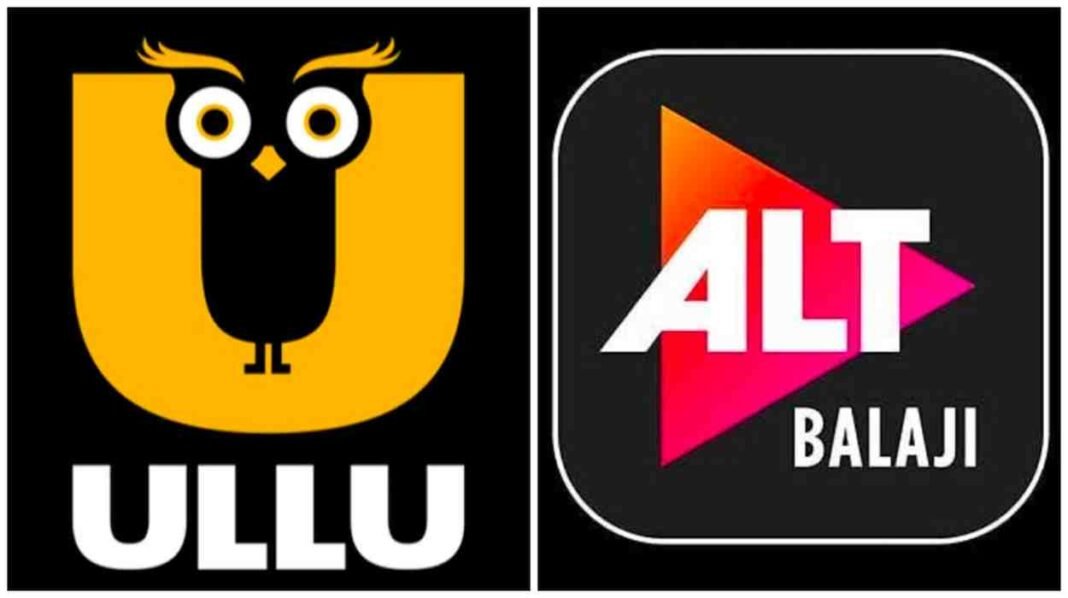New Delhi: In a crackdown on online content, the Central Government has directed the blocking of mobile applications and websites such as ULLU, ALTBalaji, Big Shots App, Desiflix, Boomex, Navarasa Lite, Gulab App, and several others for allegedly streaming “obscene,” “vulgar,” and, in some cases, “pornographic” material. A total of 25 such platforms have come under the government’s scanner for violating content regulations.
The action, spearheaded by the Ministry of Information and Broadcasting, is aimed at curbing the spread of inappropriate and explicit content through these lesser-known OTT platforms.
According to officials, the blocked apps and websites were found to be operating without adequate checks and were allegedly distributing objectionable material that could have adverse societal impacts.
According to senior officials, these platforms were found to be in serious violation of Indian laws, particularly concerning the depiction of sexually explicit content.
The decision came following detailed assessments, where the concerned authorities reportedly found prolonged scenes involving nudity and sexually suggestive acts.
The content, officials claimed, was lacking in narrative depth, thematic substance, or any kind of social relevance, with visuals dominated by crude sexual innuendo and indecency.
Apps Hosted Content of ‘Pornographic Nature’
Sources in the ministry revealed that several of the banned apps had been streaming content that included sexually explicit acts with little to no censorship.
“Some of the scenes clearly amounted to pornography,” an official said, adding that many of these platforms depicted sexuality in “inappropriate family settings and other sensitive scenarios,” further aggravating concerns.
The official further stated that most of the blocked platforms had no mechanisms for age restrictions, parental control, or clear content warnings, exposing minors to explicit visuals.
“The platforms failed to abide by even the most basic self-regulatory guidelines and were operating in a completely unregulated digital space,” the official noted.
Legal and Regulatory Developments
The move by the I&B Ministry comes at a time when the issue of sexually explicit content on digital platforms has been drawing national attention.
Earlier in April, the Supreme Court issued notices to the Union Government and several major streaming services—including Netflix, Amazon Prime Video, ULLU, ALTT, and others—in response to a Public Interest Litigation (PIL) that sought action against the growing trend of obscene material being circulated via OTT and social media platforms.
The PIL alleged that these platforms were disseminating sexually provocative content with no regulation or accountability. A bench comprising Justices B.R. Gavai and Augustine George Masih acknowledged the seriousness of the concerns but clarified that the matter lies primarily within the jurisdiction of the executive and legislature.
“It’s not our domain; you do something,” the Court reportedly told the government, urging it to take appropriate steps under existing laws.
ULLU, ALTBalaji Among Repeat Offenders
This is not the first time platforms like ULLU and ALTBalaji have drawn flak for their content. In May, ULLU was embroiled in controversy when a clip from its web series House Arrest featuring former Bigg Boss contestant Ajaz Khan went viral for its allegedly vulgar scenes.
The backlash led to widespread condemnation from civil society and public representatives. Shiv Sena (UBT) MP Priyanka Chaturvedi publicly criticised the platform, pointing out its repeated evasion of regulatory measures.
Taking to X (formerly Twitter), she wrote, “I have raised this in the Standing Committee that apps such as ULLU and ALTBalaji have managed to escape previous bans issued by the I&B Ministry for obscene content. I am still awaiting their reply.”
Her statement was echoed by several other leaders and triggered renewed calls for stringent monitoring of OTT content.
National Commission for Women (NCW) Reacts
Following the public uproar over House Arrest, the National Commission for Women (NCW) took suo motu cognizance of the series. The Commission slammed the depiction of women in the series, stating that it reinforced misogynistic stereotypes and trivialised sexual violence.
The NCW issued a formal warning and recommended regulatory scrutiny of OTT platforms publishing such content. The panel indicated that repeat violations could result in a complete ban and sought urgent attention from the Ministry of Electronics and Information Technology (MeitY) and I&B Ministry.
Industry Implications
This latest crackdown sends a strong message to the burgeoning OTT industry, especially low-cost platforms operating in regulatory grey zones. Experts believe that the action could prompt a wave of stricter compliance measures across the digital entertainment sector.
Media analyst and digital rights advocate Raghav Anand observed, “The line between artistic freedom and irresponsible broadcasting is fine, but it cannot be ignored. The government’s move will force platforms to introspect and adopt better content moderation policies.”
He further added that while mainstream platforms like Netflix and Amazon Prime have adopted layered content guidelines, emerging OTT players often bypass such protocols to lure audiences with sensationalism.
Government Stance and Future Action
The government, meanwhile, has reiterated its commitment to ensuring a safe and responsible digital ecosystem. Officials said that the blocking orders were issued under the provisions of the Information Technology Act, 2000, and after consulting with cybersecurity and content regulation bodies.
Further investigations are reportedly underway, and more platforms could come under scrutiny. The Ministry is also working on strengthening the existing OTT content regulation framework, with possible new rules mandating stricter content classification, viewer authentication, and compliance reporting.
Conclusion
With the rapid expansion of OTT platforms in India and increasing internet penetration, the challenge of content moderation has become a pressing concern.
While this latest move may face criticism from advocates of free expression, the Centre appears resolute in its stance that platforms must operate within the legal and moral framework of Indian society.
The blocked platforms have not yet issued public responses, and it remains to be seen whether they will appeal the ban or restructure their content offerings to meet regulatory standards.








